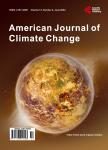Are Polyploid Species Less Vulnerable to Climate Change? A Simulation Study in North American Crataegus
Are Polyploid Species Less Vulnerable to Climate Change? A Simulation Study in North American Crataegus作者机构:Department of Biological Sciences University of Calgary Calgary Canada
出 版 物:《American Journal of Climate Change》 (美国气候变化期刊(英文))
年 卷 期:2023年第12卷第3期
页 面:359-375页
学科分类:07[理学] 070601[理学-气象学] 0706[理学-大气科学]
主 题:Climate Change Crataegus Ecoregion North America Range Change Species Distribution Modeling
摘 要:Understanding the mechanisms underlying plant responses to climate change is an important step toward developing effective mitigation strategies. Polyploidy is an important evolutionary trait that can influence the capacity of plants to adapt to climate change. The environmental flexibility of polyploids suggests their resiliency to climate change, however, such hypotheses have not yet received empirical evidence. To understand how ploidy level may influence response to climate change, we modeled the current and future distribution of 54 Crataegus species under moderate to severe environments and compared the range change between diploids and polyploids. The majority of studied species are predicted to experience considerable range expansion. We found a negative interaction between ploidy and ecoregions in determining the response to climate change. In extreme environments, polyploids are projected to experience a higher range expansion than diploids with climate change, while the opposite is true for moderate environments. The range expansion of Crataegus species can be attributed to their tolerance for a wide range of environmental conditions. Despite the higher tolerance of polyploids to extreme environments, they do not necessarily outperform diploids in moderate environments, which can be attributed to the varying nature of species interactions along a stress gradient.



